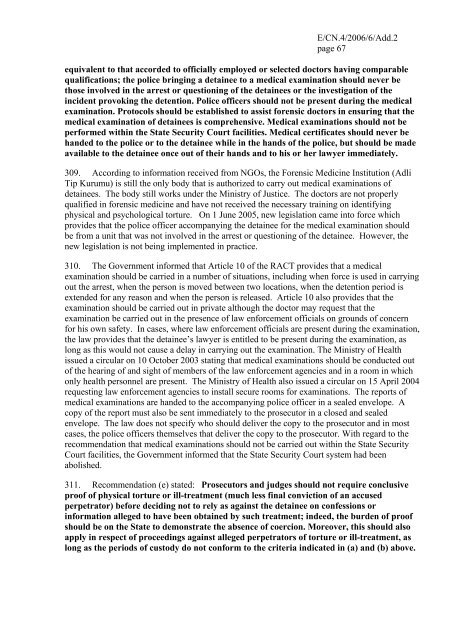E Economic and Social Council - acnudh
E Economic and Social Council - acnudh
E Economic and Social Council - acnudh
You also want an ePaper? Increase the reach of your titles
YUMPU automatically turns print PDFs into web optimized ePapers that Google loves.
E/CN.4/2006/6/Add.2<br />
page 67<br />
equivalent to that accorded to officially employed or selected doctors having comparable<br />
qualifications; the police bringing a detainee to a medical examination should never be<br />
those involved in the arrest or questioning of the detainees or the investigation of the<br />
incident provoking the detention. Police officers should not be present during the medical<br />
examination. Protocols should be established to assist forensic doctors in ensuring that the<br />
medical examination of detainees is comprehensive. Medical examinations should not be<br />
performed within the State Security Court facilities. Medical certificates should never be<br />
h<strong>and</strong>ed to the police or to the detainee while in the h<strong>and</strong>s of the police, but should be made<br />
available to the detainee once out of their h<strong>and</strong>s <strong>and</strong> to his or her lawyer immediately.<br />
309. According to information received from NGOs, the Forensic Medicine Institution (Adli<br />
Tip Kurumu) is still the only body that is authorized to carry out medical examinations of<br />
detainees. The body still works under the Ministry of Justice. The doctors are not properly<br />
qualified in forensic medicine <strong>and</strong> have not received the necessary training on identifying<br />
physical <strong>and</strong> psychological torture. On 1 June 2005, new legislation came into force which<br />
provides that the police officer accompanying the detainee for the medical examination should<br />
be from a unit that was not involved in the arrest or questioning of the detainee. However, the<br />
new legislation is not being implemented in practice.<br />
310. The Government informed that Article 10 of the RACT provides that a medical<br />
examination should be carried in a number of situations, including when force is used in carrying<br />
out the arrest, when the person is moved between two locations, when the detention period is<br />
extended for any reason <strong>and</strong> when the person is released. Article 10 also provides that the<br />
examination should be carried out in private although the doctor may request that the<br />
examination be carried out in the presence of law enforcement officials on grounds of concern<br />
for his own safety. In cases, where law enforcement officials are present during the examination,<br />
the law provides that the detainee’s lawyer is entitled to be present during the examination, as<br />
long as this would not cause a delay in carrying out the examination. The Ministry of Health<br />
issued a circular on 10 October 2003 stating that medical examinations should be conducted out<br />
of the hearing of <strong>and</strong> sight of members of the law enforcement agencies <strong>and</strong> in a room in which<br />
only health personnel are present. The Ministry of Health also issued a circular on 15 April 2004<br />
requesting law enforcement agencies to install secure rooms for examinations. The reports of<br />
medical examinations are h<strong>and</strong>ed to the accompanying police officer in a sealed envelope. A<br />
copy of the report must also be sent immediately to the prosecutor in a closed <strong>and</strong> sealed<br />
envelope. The law does not specify who should deliver the copy to the prosecutor <strong>and</strong> in most<br />
cases, the police officers themselves that deliver the copy to the prosecutor. With regard to the<br />
recommendation that medical examinations should not be carried out within the State Security<br />
Court facilities, the Government informed that the State Security Court system had been<br />
abolished.<br />
311. Recommendation (e) stated: Prosecutors <strong>and</strong> judges should not require conclusive<br />
proof of physical torture or ill-treatment (much less final conviction of an accused<br />
perpetrator) before deciding not to rely as against the detainee on confessions or<br />
information alleged to have been obtained by such treatment; indeed, the burden of proof<br />
should be on the State to demonstrate the absence of coercion. Moreover, this should also<br />
apply in respect of proceedings against alleged perpetrators of torture or ill-treatment, as<br />
long as the periods of custody do not conform to the criteria indicated in (a) <strong>and</strong> (b) above.
















